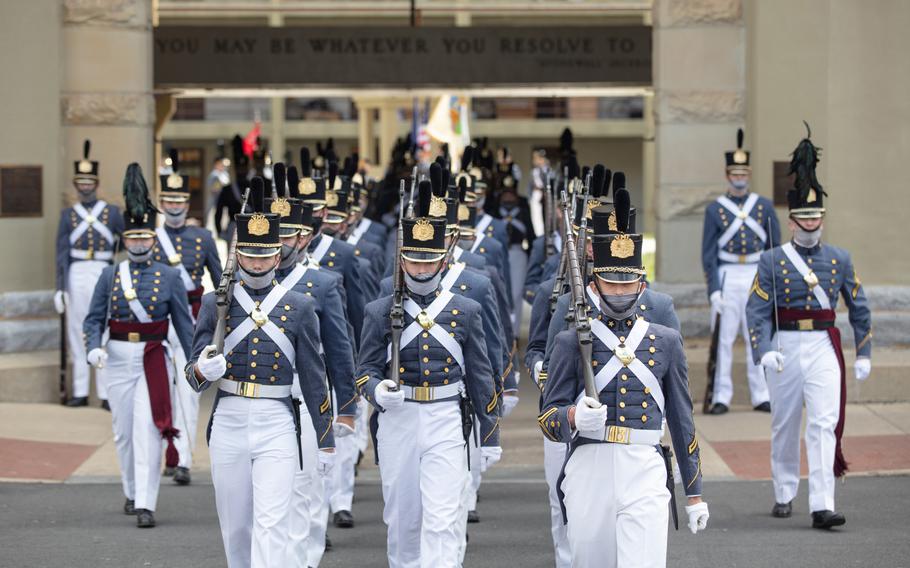
The Corp of Cadets march out of the barracks in May for a change-of-command ceremony at Virginia Military Institute in Lexington. (Parker Michels-Boyce/For The Washington Post)
They marched out of their castle-like barracks and onto the crisp green parade field to the sounds of drums, trumpets and bagpipes. Minutes later, the cadets at Virginia Military Institute stood at attention in their uniforms of white pants and gray coatees.
On a sunny Friday in May, the corps was poised to mark a first in the 182-year history of the nation's oldest state-supported military college: anointing a female student as their top military commander.
Kasey Meredith, a rising senior from Pennsylvania, strode past photographers and positioned herself next to the college's superintendent, retired Army Maj. General Cedric Wins, the institute's first Black leader. Then, Wins handed her VMI's white battle flag and the two clasped the colors, signifying the corps' change of command.
But the stirring image of Meredith becoming VMI's first female regimental commander belied the misogyny she and other female cadets have endured since women were first admitted to the school in 1997 after a legal battle that went all the way to the Supreme Court.
In the six weeks since her appointment was announced, Meredith, an international studies major with plans to commission as a second lieutenant in the Marine Corps next year, had been the object of derision by VMI students on Jodel, a widely used anonymous social media app where female cadets are routinely dismissed as "shedets" or "sheeds."
The posters on Jodel accused VMI officials of selecting Meredith out of "bull---t politics" or as "a publicity stunt" to appease state-appointed investigators examining racism and sexism at the college.
Photos were uploaded to the app with her head scratched out or with an egg superimposed over her face. A joke about her engaging in a sex act with her significant other got more than 50 upvotes.
Meredith, who declined an interview request, seemed unfazed and confident on the day she took charge of the corps.
"It's amazing to be the first female," she told the Roanoke Times. "It's amazing to give that type of incentive to younger generations who are coming to VMI."
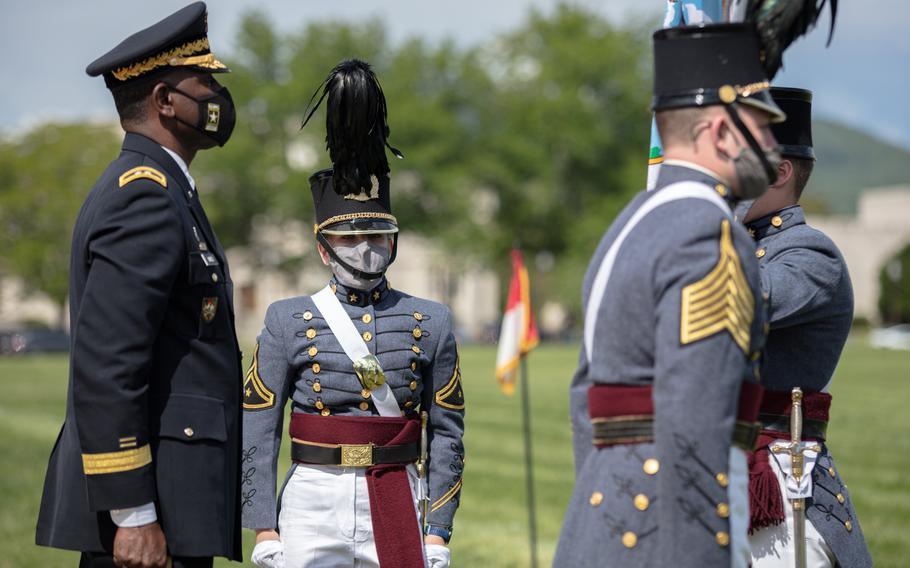
Kasey Meredith, center, stands next to Superintendent Cedric Wins, left, as she is installed as the first female leader of the VMI Corps of Cadets. (Parker Michels-Boyce/For The Washington Post)
But those young women won't find VMI — where men make up 87% of the school's 1,698 cadets — an easy place to navigate, according to the independent investigation by the law firm Barnes & Thornburg that was released two weeks after Meredith's achievement.
The investigation found that sexism on the Lexington campus — which received $19.3 million in state funding for fiscal 2021, along with $33 million toward a new aquatics center — may be just as serious a problem as racism.
At a college where sexual contact between cadets on campus is forbidden, "sexual assault is prevalent at VMI yet it is inadequately addressed by the Institute," the report said. Fourteen percent of female cadets surveyed by the law firm reported they'd been sexually assaulted at VMI and 63% said another cadet had confided being sexually assaulted.
"Many female cadets reported a consistent fear of assault or harassment by their fellow male cadets," the report warned. "Many female cadets also feel that assault complaints are not or will not be taken seriously by the VMI administration or that a cadet will suffer retaliatory consequences for reporting them."
These were damaging findings for a school whose identity revolves around its strict honor code and touts its policy of expelling any student caught lying, cheating, stealing or tolerating those who do.
But a VMI spokesman defended the school, pointing to passages in the report where "many women expressed pride in VMI" and in their treatment by male cadets and that praised the college's handling of sex assault and harassment allegations.
VMI's policies barring discrimination, harassment, sexual misconduct, and retaliation are "well written and easy to understand," the investigation found. The college's Inspector General's office has "robust procedures" for investigating complaints, and its Title IX records "reflected a competent and compliant investigation and adjudication process."
In a statement to The Washington Post, VMI's spokesman said: "All reports of sexual assault and harassment are handled by VMI with the utmost urgency, in accordance with federally-approved policy, and in the best interest of the cadet who makes the report."
For this story, The Post spoke to more than a dozen women who attended VMI, graduated, or still go there about what they've experienced. The vast majority have been enrolled within the past two years. Nearly all spoke on the condition of anonymity for fear of reprisal from college administrators, fellow cadets or VMI's powerful alumni network. Several said they were sexual assault victims. The Post's policy is not to identify such victims in most cases.
In the interviews, they described an atmosphere of hostility toward women, with constant ridicule at their expense on Jodel, and an expectation of backlash from male cadets if they reported incidents in which they've been groped or raped.
One upperclasswoman said she was raped in January in the barracks, where men and women live side by side, by a male cadet who'd been a friend. But she didn't feel comfortable alerting VMI police or school officials, though she said she trusts VMI's Title IX office to properly investigate assaults. Mostly, she said, she feared retribution from male cadets and a reflexive defense of the perpetrator as "a good guy."
"They would think I am trying to get him in trouble. They'd say, 'Hey, think about this guy's commission, and the life you're about to ruin,' " she said. "But what about me? I was assaulted, and I'm dealing with the trauma."
A second female cadet told The Post she was molested her freshman year in 2019 by an older student inside a campus building.
"He came up behind me and started kissing me and groping my butt and crotch, and I kept saying no the entire time," she recalled.
She said she filed a complaint with the Title IX office, but that the male cadet only received a combination of demerits, campus confinement and penalty marching tours.
A school official discouraged her from pushing for more punishment, she said, telling her: "Just a reminder, you know he is a couple months away from graduation."
The official also said, " 'Are you sure he knew you didn't want to do this?' That made no sense. Why would have I reported the case if I wanted to kiss him?"
She said the male cadet was allowed to stay at school. "It just made me really anxious seeing him," she said. "I was still afraid of it happening again."
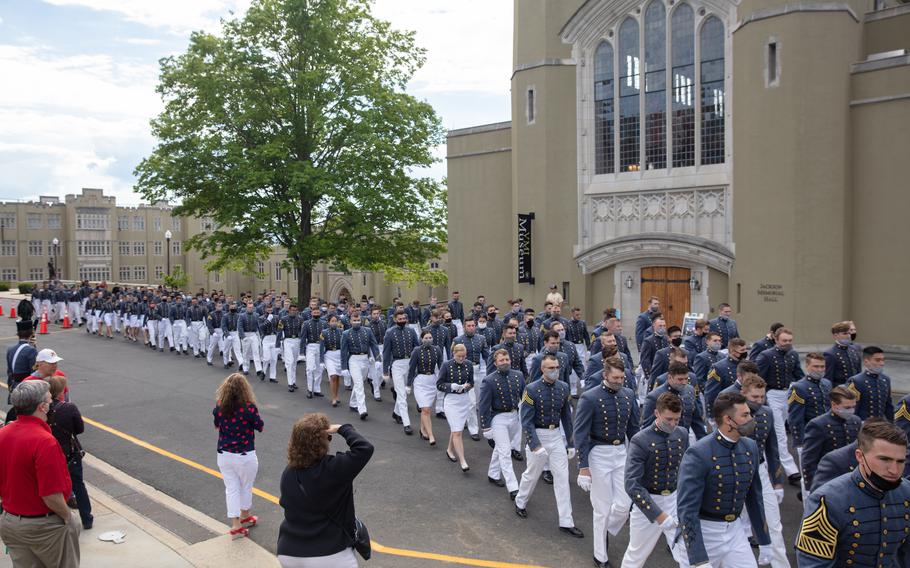
Members of the class of 2021 march to the change of command at VMI, where men make up 87% of the school's 1,698 cadets. (Parker Michels-Boyce/For The Washington Post)
One bright spot, she said, was VMI's counseling center. A woman who worked there "validated my concerns and made sure I knew what happened wasn't my fault," the cadet said. "She gave me good ways to cope. She told me not to make eye contact with him and that I should remain assertive and confident."
A third woman, who graduated from VMI in 2019, said she was attacked her freshman year in her barracks room. She'd invited a friend, a fellow freshman, over to her room for help with some homework. He raped her instead.
"I kept saying, 'Please stop.' I kept saying, 'We're not allowed to do this,' " the woman said. "After it happened, I shut down for a week" before telling classmates and then VMI's commandant staff what happened.
"But then no one from the school ever got back to me," she said. "And I never followed back up. I was embarrassed. It was so close to the end of the school year. By then, I just wanted to move on."
The worst part, she said, was that same male cadet tried to attack her the next academic year while she was on a jog. She was running down a large hill on campus, she said, and suddenly he emerged running behind her, grabbing and ripping her shirt.
"I think he thought he was being funny and joking around," she said. "But I ran up the stairs behind barracks and I went to my room. I don't think I've ever run so fast."
The male cadet, she said, wound up leaving VMI shortly after the beginning of their junior year.
— — —
In its investigation into VMI, Barnes & Thornburg found that while the school "conducts extensive sexual assault training," male cadets "treat it as a joke and an opportunity for misogynistic humor, without consequence."
Asked about this finding, the school said it could not respond to "the many unconfirmed, anecdotal allegations throughout the report." Its spokesman added, "VMI expects each cadet to participate in the required Title IX training with as much, if not more, seriousness as they would approach their academic classes."
Attacks trigger ridicule, too. In March, VMI issued a federally mandated Clery Crime Alert to the campus about a male cadet who allegedly "inappropriately touched several females" inside the barracks.
The incident quickly became fodder on Jodel for sexist jokes about "the sheed diddler" and bitter commentary about the presence of women at VMI.
Jodel is so popular at VMI that the school mentions it by name in its Blue Book of cadet regulations, warning students that "anonymously targeting" others via such apps is "abhorrent." In its statement, VMI said that the First Amendment protects "much of the speech" on Jodel and that it's "nearly impossible" to identify the users, though the campus police would try to do so if students violated state or federal laws while posting on the app.
But comments denigrating women aren't limited to Jodel. During the college's talent show in March, a male cadet performed a stand-up comedy routine in which he joked about sexual misconduct at VMI, according to three students who were in the audience.
Two said that VMI's commandant, Bill Wanovich, laughed and clapped at the end of the student's set.
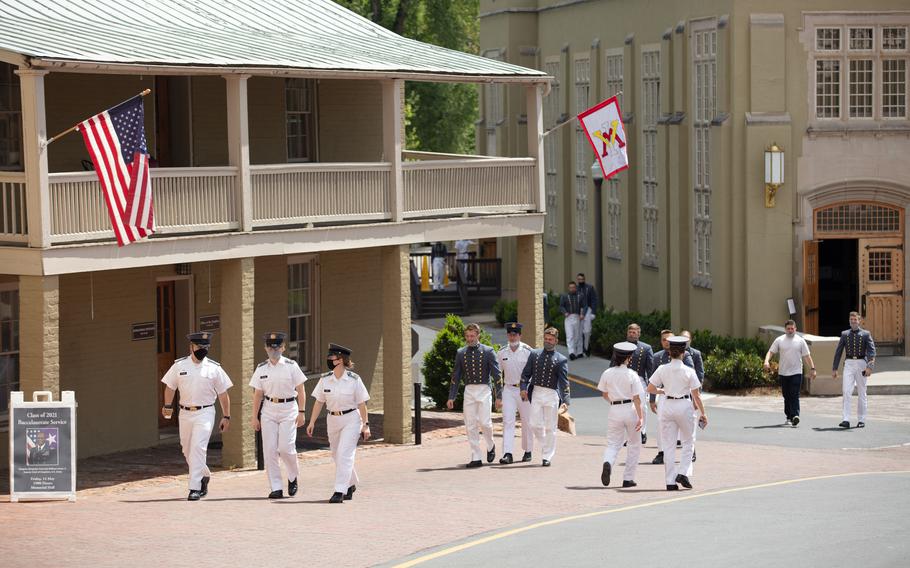
Cadets at VMI in May. (Parker Michels-Boyce/For The Washington Post)
"This was getting applause from the commandant?" said one male cadet who just graduated and spoke on the condition of anonymity for fear of reprisal. "It felt like we were in the twilight zone. We didn't know what to do."
Wanovich, whose tenure as commandant was marred in 2017 after he posed in an offensive Halloween photo on campus, just retired from VMI.
In an interview, he denied laughing or clapping or giving his approval in any way. Wanovich also said the cadet-comedian did not joke about sexual misconduct but instead called female cadets during his routine "sheeds" and described women as tough or manly.
The cadet's routine, Wanovich said, was reported to school officials for potential Title IX violations and to the cadet equity association, a student group that investigates incidents of discrimination and sexual harassment. He added that the student was punished almost immediately: He lost his rank and was given a written reprimand, a punishment of campus confinement and penalty marching tours.
Some women who heard about the stand-up routine after the talent show were furious that VMI officials sat in the audience without halting him.
"I was upset when I heard about it," said one Black female student. "That cadet was making fun of something that could have very well happened to me."
She described racism and sexism as "equally bad at VMI. They're both systemic. The word here is entitlement."
White men arrive at VMI with a sense of superiority over women and people of color, she said, and the school confirms it instead of challenging it.
Another Black woman at VMI said she considers the racism on campus "a harsher problem," but that incidents of men ridiculing women are more frequent.
Complaining about the atmosphere often feels futile, the women say.
The female cadet who decided not to report her rape in January said she did register her concerns about the college's misogynistic culture to VMI's commandant staff.
"But when I did, one official questioned whether I belonged here," she said. "The person said, 'If we keep changing the rules here to make people feel comfortable, this school isn't going to be what it is anymore.'"
The investigation into the climate at VMI noted that it is the only school among Virginia's public or private nonprofit universities where students can be punished for a drug or alcohol offense that comes to light during a report of sexual assault.
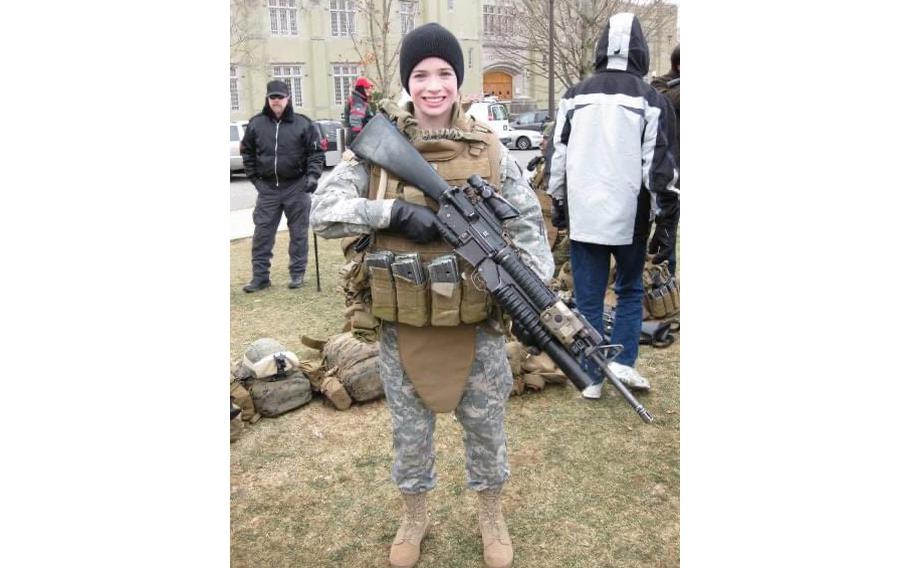
Elizabeth Dobbins Moskowitz displays an unloaded weapon when she was a 20-year-old sophomore at Virginia Military Institute. (Courtesy of Elizabeth Dobbins Moskowitz)
In an interview with The Washington Post, Virginia Del. Dan Helmer, D-Fairfax, said VMI pushed to be exempted from the sexual assault legislation he proposed in 2020. It was designed to make it easier for victims at public and private colleges in Virginia to come forward by offering them immunity from drug and alcohol offenses.
VMI was so opposed that its superintendent at the time, retired Army Gen. J.H. Binford Peay III, visited Helmer in Richmond.
VMI already had a policy of offering amnesty for minor disciplinary infractions, such as drinking, in connection with reports of discrimination, harassment, retaliation or sexual misconduct. But not for drug offenses. In practice, though, the college says, no student in recent memory who has reported — or cooperated into an investigation of — a sexual assault has been denied amnesty.
Peay told Helmer that drugs posed a far more serious threat to student discipline than sexual assault, the lawmaker said.
When reached by The Post, Peay hung up the phone.
The House passed the bill without an exemption for VMI. But the state Senate granted it in its version of the legislation, using language that avoided naming VMI.
As the two legislative bodies negotiated, Sen. Thomas K. Norment Jr. (R-James City), a 1968 VMI graduate, told Helmer that he and his colleagues wouldn't pass the bill without the VMI carve-out, Helmer said. A spokesman for Norment did not return messages for comment.
Helmer said he didn't want to risk losing a law that could help so many sexual assault victims. But he did extract one concession: VMI's exemption would be spelled out in the law's final language.
Next year, Helmer said, he plans to introduce legislation to strip VMI of its exemption.
— — —
She didn't want her father to hear the testimony about her sexual assault so the VMI cadet asked him to wait outside the Rockbridge County courtroom during the June 9 sentencing of her attacker.
Boris Rodrigo Lopez, 23, a former VMI student from Northern Virginia, had already pleaded guilty to aggravated sexual battery and breaking and entering for the September 2019 attack.
She'd been sleeping alone in her barracks room when she woke up and found him there, according to court testimony and the VMI police report. She told him to leave, then fell back asleep. But when she woke again, the police report said, he was on top of her. She struggled, telling him, "Stop" and "I don't want this" and "You are hurting me."
When he finally left, she testified at his sentencing, "I was just ... crying and crying and crying."
She reported the assault to police and went to the hospital for a forensic examination. Rodrigo Lopez was arrested about a week later.
Though she has remained at VMI, the assault has destroyed her sense of herself, she told the court. She's no longer certain that she wants to join the military after graduation. She has no interest in forging new friendships, she said, because she's lost her trust in strangers.
The past year at VMI, she said, was especially difficult because she served as a Title IX adviser to a freshman who was going through her own assault case. "And mine is still not done," she said. "It doesn't go away. Ever."
Her mother testified that her daughter suffered a panic attack during an ROTC weekend field training exercise after the assault and "just like that, she felt that she could no longer lead soldiers."
The mother also confirmed her daughter's earlier testimony: She wouldn't let her child go to The Citadel, a rival military college in South Carolina, believing VMI was safer for women.
"Little did I know," the mother said, "that I sent her to the wrong place."
Between 2017 and 2019, VMI reported 14 rapes, one of them statutory; 14 incidents of "forcible fondling" and four cases of stalking. By comparison, during those same years, The Citadel reported seven rapes, along with one case of fondling and one incident of stalking.
VMI's spokesman said the college's "higher number of reports reflects the accessibility" of its reporting procedures.
"At VMI, one reported rape or sexual assault is one too many and until that number remains at zero, we will continue to find new ways to address the challenge," the college said in a statement.
At his sentencing, Rodrigo Lopez said he could not remember much about the attack because he'd been so intoxicated that night — he'd downed beer and three flasks of alcohol, he said.
"I'm very sorry for how she feels right now. ... I hope she can forgive me," Rodrigo Lopez testified, "but I know it's going to take time for that."
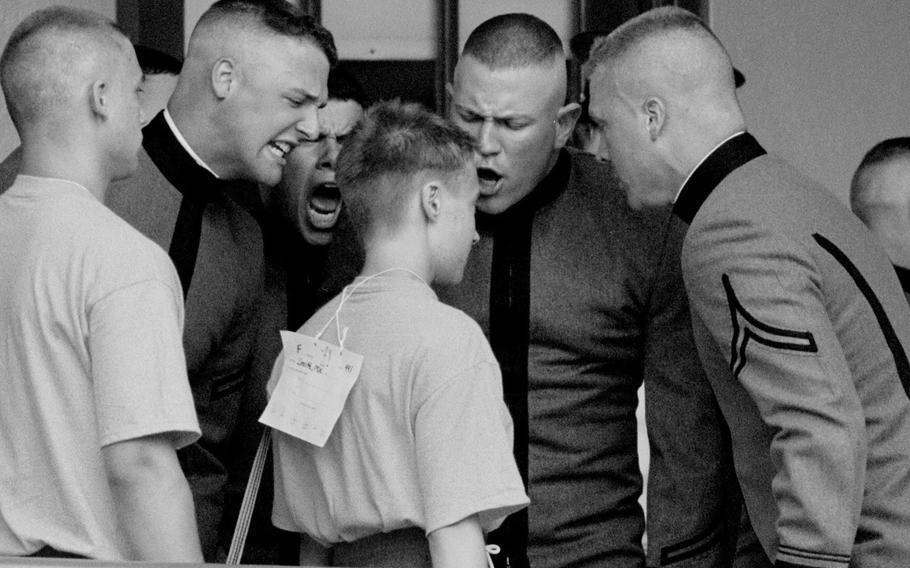
Megan Smith gets castigated by male upperclassmen in August 1997 as women participate for the first time in the start of VMI’s infamous “rat line.” (Nancy Andrews/The Washington Post)
Jared Moon, the commonwealth's attorney for Rockbridge County and the City of Lexington, argued for a 10-year prison sentence for Rodrigo Lopez. "It takes a special kind of girl, woman, to go to VMI," Moon said, where the "vast, vast majority of your classmates" are male. "He took something from her. He took a lot from her that night."
Rodrigo Lopez's attorney, Ben Thurman, argued for a "substantial period of supervised probation with a large suspended sentence," saying this was Rodrigo Lopez's first criminal offense in an "otherwise spotless record."
But Moon told the judge that Rodrigo Lopez had been accused of two Title IX "possible violations" at VMI. "Both allegations involve him touching women without their consent," the prosecutor said.
Though he'd never been criminally charged in those Title IX investigations, Rodrigo Lopez "seems to acknowledge" his guilt in one Title IX case, which also involved alcohol, Moon said. The other alleged transgression, Moon said, lacked witnesses and the claim was determined to be "not substantiated."
VMI declined to address whether Rodrigo Lopez's prior Title IX cases were investigated by the campus police and why they did not result in criminal charges. In general, the college said, victims "are always encouraged to pursue charges both through the school and through the police," but "their wishes guide whether the school pursues charges" against alleged perpetrators.
In the end, Rockbridge County Circuit Court Judge Christopher Russell handed Rodrigo Lopez a five-year sentence, crediting him for pleading guilty and sparing the female cadet from a trial and cross-examination. But Russell also criticized VMI, which, just nine days earlier, had been condemned by the state-ordered investigation for its "sexist culture."
"It's a sad day for Virginia Military Institute," the judge said. "I see the investigating officer from the VMI police department here in the courtroom. Can't help but feel a little disappointed that someone from the administration at VMI did not attend this hearing to listen to the recounting of the behavior in the barracks. That kind of reflects poorly on an institution that I respect."
— — —
VMI fought a long legal battle to keep women from being admitted after a Northern Virginia high school student objected to being excluded on the basis of her gender. The Justice Department sued on her behalf in 1990.
In a landmark majority opinion written 25 years ago by Ruth Bader Ginsburg, the justices declared that the college's barring of women was unconstitutional, a ruling that meant it had to admit women or give up state funding. (The ninth justice, Clarence Thomas, recused himself because his son was a VMI student at the time.)
About a decade after going co-ed, VMI found itself the target of a federal Education Department investigation examining whether its culture and policies were sexist and hostile toward female cadets.
When the Associated Press wrote about the federal probe in 2009, it quoted a senior, Elizabeth Dobbins, who defended the school.
"I don't think there's a male model here," she said. "There's a military model."
Now Elizabeth Dobbins Moskowitz, who graduated from VMI in 2010 and works as an attorney for the federal government, regrets those remarks.
She said she served as a cadet captain who helped out with the college's public affairs and marketing and felt that her support would make her feel better accepted by the school. It didn't.
One time, she and a small team of male cadets had to spend a few days hiking in the woods as part of a training exercise. "On the first day, we set off," she recalled, "this male cadet turned to me out of nowhere and said, 'There's no Title IX in the woods.' I was shocked. I didn't even know how to respond, so I didn't." The most harrowing moment she faced was when a male cadet — the son of a former prominent VMI official — threatened to murder her. Once, she remembered, she woke up in the middle of the night and found him in her room.
"He looked at me in the eyes and said, 'I am going to kill you, and you're going to die,' " she recalled. "Another time, he wrote my name on a pumpkin and stabbed the pumpkin to pieces with a bayonet outside my barracks room while I watched."
She said she reported his behavior to school officials, but nothing happened. She suspects his father's status as a former VMI official insulated him from punishment.
In May, she messaged him on Facebook.
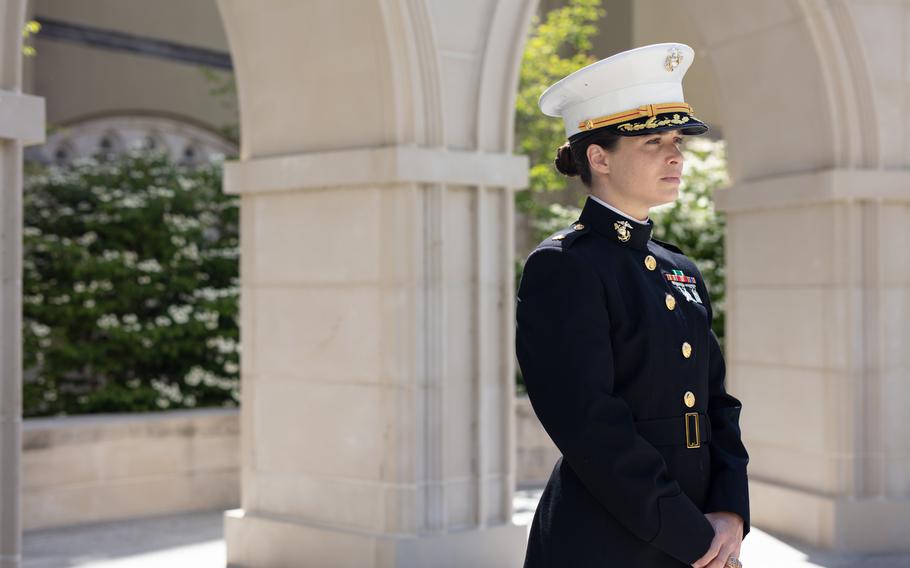
Elizabeth Dobbins Moskowitz, a 2010 graduate of VMI, says she was threatened and heckled by male cadets when she attended the school. (Parker Michels-Boyce/For The Washington Post)
"Do you remember when you wrote my name on a pumpkin and stabbed it with a bayonet outside of my barracks room while I watched?" she asked. "I wish you hadn't done that to me."
According to a screenshot of their exchange, the man wrote back, saying, "I wish I hadn't either. I think about it a lot. ... I don't regret much about VMI cause despite all the racism and militarism I learned much," he said. "I regret treating you the way I did. ... I really hope you can forgive me."
Last month, Moskowitz traveled from her California home to Lexington. She wanted to see Kasey Meredith become VMI's first female regimental commander.
Despite their age difference, Moskowitz felt a bond with the rising senior: Meredith plans on commissioning into the Marine Corps, just as Moskowitz had done 11 years ago.
Watching Meredith take command, Moskowitz said she felt a rush of pride and hope. A month later, she joined the VMI Foundation Board of Trustees, which helps raise and invest money for the college. It's a way, Moskowitz said, to have an impact on the climate at her alma mater.
"I wouldn't go to VMI again for college," she said, "and I wouldn't want my daughter to do it, either — unless the school changes."
After the change-of-command ceremony, Moskowitz and other graduates got to meet Meredith at a reception for female graduates. They gave her a congratulatory card, plus a copy of the 2000 book, "Breaking Out," which explores VMI's first year of co-education.
Moskowitz asked Meredith if she, too, had been heckled while in command of male cadets. Meredith, she said, recounted how she'd been booed recently by some men.
"She didn't say anything more about it. She didn't need to," said Moskowitz. "I told her I understood. I assured her life will be better after VMI."
"The outside world is better," she recalled telling Meredith. "Just stick it out."